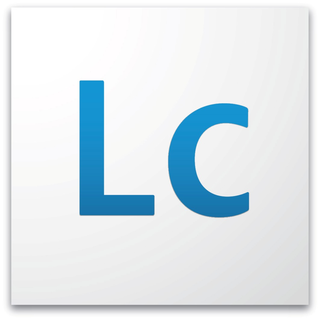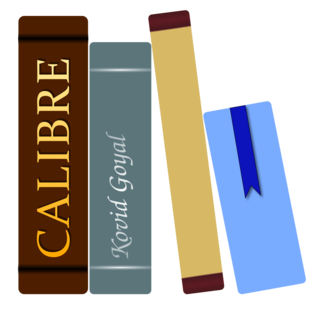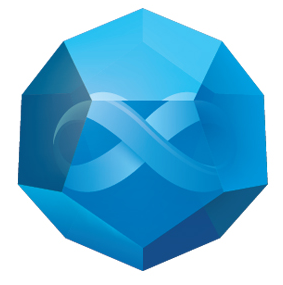
Adobe Flash is a discontinued multimedia software platform used for production of animations, rich internet applications, desktop applications, mobile apps, mobile games, and embedded web browser video players.
Electronic publishing includes the digital publication of e-books, digital magazines, and the development of digital libraries and catalogues. It also includes the editing of books, journals, and magazines to be posted on a screen.
A Rich Internet Application is a web application that has many of the characteristics of desktop application software. The concept is closely related to a single-page application, and may allow the user interactive features such as drag and drop, background menu, WYSIWYG editing, etc. The concept was first introduced in 2002 by Macromedia to describe Macromedia Flash MX product. Throughout the 2000s, the term was generalized to describe browser-based applications developed with other competing browser plugin technologies including Java applets, Microsoft Silverlight.

Apache Flex, formerly Adobe Flex, is a software development kit (SDK) for the development and deployment of cross-platform rich web applications based on the Adobe Flash platform. Initially developed by Macromedia and then acquired by Adobe Systems, Adobe donated Flex to the Apache Software Foundation in 2011 and it was promoted to a top-level project in December 2012.
Adobe Flash Player is a discontinued computer program for viewing multimedia content, executing rich Internet applications, and streaming audio and video content created on the Adobe Flash platform. It can run from a web browser as a browser plug-in or independently on supported devices. Originally created by FutureWave under the name FutureSplash Player, it was renamed to Macromedia Flash Player after Macromedia acquired FutureWave in 1996. After Adobe acquired Macromedia in 2005, it was developed and distributed by Adobe as Adobe Flash Player. It is currently developed and distributed by Zhongcheng for users in China, and by Harman International for enterprise users outside of China, in collaboration with Adobe.
Active Directory Rights Management Services is a server software for information rights management shipped with Windows Server. It uses encryption and a form of selective functionality denial for limiting access to documents such as corporate e-mails, Microsoft Word documents, and web pages, and the operations authorized users can perform on them. Companies can use this technology to encrypt information stored in such document formats, and through policies embedded in the documents, prevent the protected content from being decrypted except by specified people or groups, in certain environments, under certain conditions, and for certain periods of time. Specific operations like printing, copying, editing, forwarding, and deleting can be allowed or disallowed by content authors for individual pieces of content, and RMS administrators can deploy RMS templates that group these rights together into predefined rights that can be applied en masse.

The Sony Reader (ソニー・リーダー) was a line of e-book readers manufactured by Sony. The first model was the PRS-500 released in September 2006 and was related to the earlier Sony Librie, the first commercial E Ink e-reader in 2004 using an electronic paper display developed by E Ink Corporation. The last model was the PRS-T3, after which Sony announced it would no longer release a new consumer e-reader.
Mobipocket SA was a French company incorporated in March 2000 that created the .mobi e-book file format and produced the Mobipocket Reader software for mobile phones, personal digital assistants (PDA) and desktop operating systems.

Adobe LiveCycle Enterprise Suite (ES4) is a service-oriented architecture Java EE server software product from Adobe Systems, used to build applications that automate a broad range of business processes for enterprises and government agencies. LiveCycle ES4 is an enterprise document and form platform that helps you capture and process information, deliver personalized communications, and protect and track sensitive information. It is utilized for purposes such as account opening, services, and benefits enrollment, correspondence management, requests for proposal processes, and other manual-based workflows. LiveCycle ES4 incorporates new features with a particular focus on mobile devices. LiveCycle applications function in both online and offline environments. These capabilities are enabled through the use of Adobe Reader, HTML/PhoneGap, and Flash Player clients to reach desktop computers and mobile devices.

Adobe AIR is a cross-platform runtime system currently developed by Harman International, in collaboration with Adobe Inc., for building desktop applications and mobile applications, programmed using Adobe Animate, ActionScript, and optionally Apache Flex. It was originally released in 2008. The runtime supports installable applications on Windows, macOS, and mobile operating systems, including Android, iOS, and BlackBerry Tablet OS.

Adobe Digital Editions is an e-book reader software program from Adobe. It is used for acquiring, managing, and reading e-books, digital newspapers, and other digital publications. The software supports EPUB and PDF. It implements a proprietary scheme of digital rights management (DRM) which, since the version 1.5 release in May 2008, allows document sharing among multiple devices and user authentication via an Adobe ID. Digital Editions is a successor to the Acrobat eBook Reader application.
The following is a comparison of e-book formats used to create and publish e-books.
Digital rights management (DRM) is the management of legal access to digital content. Various tools or technological protection measures (TPM), such as access control technologies, can restrict the use of proprietary hardware and copyrighted works. DRM technologies govern the use, modification and distribution of copyrighted works and of systems that enforce these policies within devices. DRM technologies include licensing agreements and encryption.
Marlin is a DRM platform, created by an open-standards community initiative called the Marlin Developer Community (MDC). The MDC develops the necessary technology, partners, and services for enabling the creation of interoperable digital content distribution services.

Calibre is a cross-platform free and open-source suite of e-book software. Calibre supports organizing existing e-books into virtual libraries, displaying, editing, creating and converting e-books, as well as syncing e-books with a variety of e-readers. Editing books is supported for EPUB and AZW3 formats. Books in other formats like MOBI must first be converted to those formats, if they are to be edited. Calibre also has a large collection of community contributed plugins.

An ebook, also spelled as e-book or eBook, is a book publication made available in electronic form, consisting of text, images, or both, readable on the flat-panel display of computers or other electronic devices. Although sometimes defined as "an electronic version of a printed book", some e-books exist without a printed equivalent. E-books can be read on dedicated e-reader devices, also on any computer device that features a controllable viewing screen, including desktop computers, laptops, tablets and smartphones.

The Nook 1st Edition is the first generation of the Nook e-book reader developed by American book retailer Barnes & Noble, based on the Android platform. The device was announced in the United States in October 2009 and was released the next month. The Nook includes Wi-Fi and AT&T 3G wireless connectivity, a six-inch E Ink display, and a separate, smaller color touchscreen that serves as the primary input device. In June 2010 Barnes & Noble announced a Wi-Fi-only model of the Nook. On June 5, 2018 Barnes and Noble announced support for logging in to BN.com and adding new content to the device will end on June 29, 2018. The second-generation Nook, the Nook Simple Touch, was announced on May 25, 2011 with a June 10 release date.
Datalogics is a computer software company formed in 1967 and based in Chicago, IL. The company licenses software development kits for working with PDF and other document file types. They have previously developed their own typesetting and database publishing software. Since 1996, Datalogics has also acted as a channel for several SDKs from Adobe Systems. These include the Adobe PDF Library, Adobe Experience Reader Extensions, Adobe Content Server, Adobe InDesign Server, Adobe PDF Converter, Adobe PDF Print Engine and Adobe Reader Mobile SDK. In 2022, Datalogics launched a new business unit called pdfRest, an API toolkit for PDF processing.

Powerflasher FDT is an integrated development environment (IDE) built on the Eclipse platform for development of Adobe Flash-based content.







